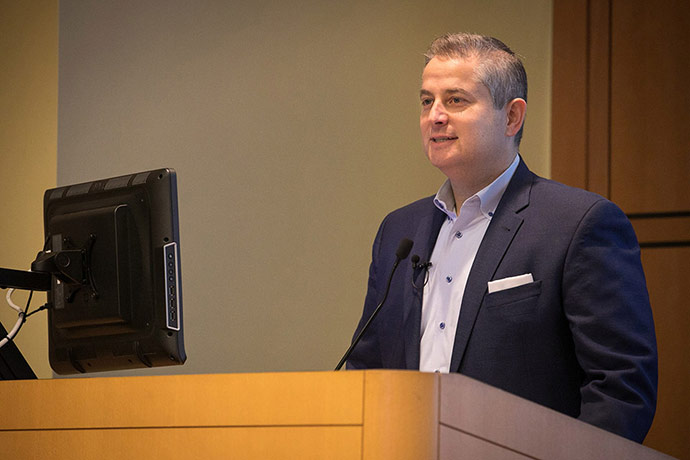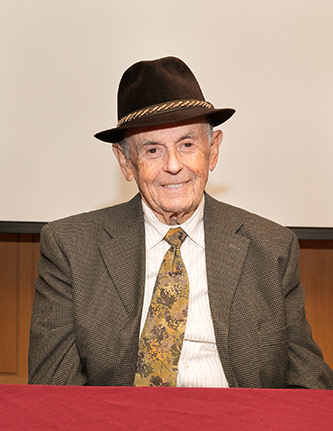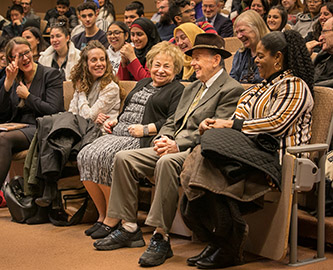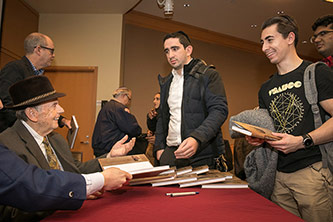Brooklyn College Welcomes Son of Acclaimed Author Who Chronicled Surviving the Holocaust as a Child
Dec. 13, 2019
Lawrence Burian discussed his father Andrew Burian and his stunning autobiography, A Boy from Bustina: A Son. A Survivor. A Witness.

“On my father’s behalf, I bore witness today, and now you are all witnesses. You all now share in the responsibility of learning the lessons of the Holocaust,” said Lawrence Burian, son of Holocaust survivor Andrew Burian at the We Stand Against Hate lecture “A Boy from Bustina.” Theyounger Burian is committed to Holocaust education through his involvement with Yad Vashem, The World Holocaust Remembrance Center, and more recently, the USC Shoah Foundation

Andrew Burian: “I am not a philosopher. I am not a historian. I am not even a writer. What I am, is a witness to the Holocaust. I have witnessed much. I have experienced much.”
“I am not a philosopher. I am not a historian. I am not even a writer. What I am, is a witness to the Holocaust. I have witnessed much. I have experienced much.” So opens the prologue to A Boy from Bustina: A Son. A Survivor. A Witness. (Yad Vashem, 2016) by Andrew Burian. In 1944, at the age of 13, was wrenched from his comfortable home in Czechoslovakia (now Ukraine) and imprisoned, first in the Mateszalka Ghetto in Hungary, and then in the Auschwitz-Birkenau concentration camp where his mother, grandfather, and grand-uncle were killed. Liberated by the U.S. Army, and reunited with his father and brother, he eventually emigrated to the United States and went on to make a new life, with a loving family and a robust Jewish community to buoy him. Silent for 15 years after his liberation, Burian became dedicated to Holocaust education and remembrance, ultimately publishing, at the age of 86, his gripping tale.
On November 25, Burian’s son Lawrence—who, inspired by his father, has also champions the cause of Holocaust remembrance—spoke about A Boy from Bustina to a packed audience in the Woody Tanger Auditorium at the Brooklyn College Library. The lecture was part of the college’s We Stand Against Hate initiative. As he opened the talk, Lawrence Burian explained that this was a bittersweet moment, the first appearance in which his father—who sat front and center with his wife Ruth Burian ’61—was not participating as a lecturer, due to health issues.
Six Million Individual Holocausts
Burian recounted his father’s story from passages in the book and his memories and impressions of growing up with a Holocaust survivor, punctuated by moments of warm banter with his mother and father.
After he arrived in the United States, 17-year-old Andrew Burian spoke little about the Holocaust; over the years his wife had pieced together enough to obtain what he calls “an incomplete understanding,”
“There have been so many studies done of the effect of trauma on people who have experienced it,” said Lawrence Burian about his father’s initial silence. “The experience of survivors not speaking for many, many years if at all is not unique to survivors. . . . When you tell a story, you are putting a beginning a middle and an end to [it], and that itself is containing it. When something is so raw and so powerful and so painful, it’s hard even to do that. You need somebody ready to listen and how to listen.
Very slowly he began to tell his children some of his experiences in a way he considered “age appropriate.”
“As my father got older and became more secure with his life, with his family, with his position in society, he became more able to speak. I, as the youngest child, learned and heard more of the story than my siblings did My father would start, much as the book does, when I was little boy, telling me not about the Holocaust but with his childhood, and to appreciate what it was like to grow up in that kind of Jewish community and what those values were. It was only as I got older that the stories became more serious.”
It was at the urging of his children and encouragement from Elie Wiesel’s famous directive, “If you listen to a witness, you become a witness,” that convinced Andrew Burian to speak out after 51 years of silence. It was and is an act of great bravery for a survivor to reach into his memory and mine the horrors of the Holocaust. There were times Burian would stop writing for months. “Each experience is as unique as man himself,” he writes in A Boy from Bustina, “and because of this, I do not think that it was a Holocaust; rather there were six million individual Holocausts.”

A lighter moment with the audience. Andrew Burian is seated with his wife Ruth. President Michelle Anderson is at far left.
Ingenuity. Luck. Divine Intervention.
Feelings of guilt remained with Burian after he was liberated, as did the universal question “why me?” asked by many survivors; 1.5 million Jewish children perished during the Holocaust, so how did he make it? Lawrence Burian, read a passage that dug into his father’s understanding of why and how he managed to stay alive:
‘I would like to state for the record that my survival is no virtue of mine. Nor was it a brilliant deed on my part. It was not heroic nor the result of the execution of a well-thought-out plan. Or even the result of a conscious effort. One might think a guiding hand from above, or at least miraculous coincidences were the instrument of my survival. I certainly subscribe to that theory, although I fail to see why I was saved, or why I would be the recipient of such grace.’
‘If one does not wish to pry into that which we do not understand, then the theory of the survival instinct, coupled with a strong unrelenting will to live with a good dose of luck, is a very strong argument.’
Lawrence Burian summed it up as ingenuity. Luck. Divine intervention.

Andrew Burian, author of A Boy from Bustina: A Son. A Survivor. A Witness. autographs his memoir.
“Now You Are All Witnesses”
The younger Burian read accounts of his father’s transport by cattle car to a ghetto in Hungary and then to two death camps; of narrow escapes, including one in which another boy was killed in his stead; acts of great cruelty; and some of bravery and kindness.
‘They tried to turn me into an animal,” says Andrew Burian in the autobiography. “They failed with me but not with everyone. However, in the process I became an orphan, a killer, a displaced person, and an immigrant. Today I am a husband, brother, father, grandfather, and great grandfather and friend. Yet people think of me as a survivor. I am. I did. But for me, it is not enough just to survive; I must bear witness.’
The phrase “not everyone” struck one student in the audience. “We often are told the story of the Holocaust; these are things that the Nazi did, but the story I heard from you, and from your father through you, is that these are the changes they did affect in people,” he stated during the question-and-answer period after the talk. “The main actors were not German Nazis themselves, although they were in the background orchestrating. It was the Hungarian soldiers. It was the Roma capo that killed a young Jewish boy. It was a German communist. It was the Czech women who resisted. For me, it was a cautionary tale of how genocidal people get others to do their will or to resist them.”
Lawrence Burian was grateful to the student for bringing up the subject. “I purposely chose excerpts from the book that did not have a single Nazi soldier taking action,” said Burian. “Now you cannot read this book without coming away with the absolute evil of what the Nazi soldiers were and did. But I think there is a very, very important message about what people can become and how people can get caught up and actually in some ways be worse than the actual leaders themselves. And there are incredible stories of people standing up to the Nazi rule and being successful. I don’t want to judge anybody; I don’t know if I would be that brave. Nobody should ever judge anybody until they’ve been in their shoes, but there is a statement of how do we react. My father doesn’t sugarcoat anything in the book, including his own behaviors, that until this day he horribly regrets.”
Burian concluded with a passage from his father’s most recent talk to students: ‘As I look at my audience, I see young, vibrant educated women and men. I see the future of these wonderful United States. And what I see is good. I feel compelled to beg you not to be complacent about the evil of discrimination or be tolerant of any form of prejudice and baseless hatred regardless of how cloaked or disguised. Be vigilant, and take responsibility, which is yours. You are our future. Each one of you will be more or less in a position to influence the course of your generation’s lives so that something like the Holocaust never happens again. I hope you will. I am confident you will. I know you will.”
The event was accompanied by the exhibit, BESA: A Code of Honor. Muslim Albanians Who Rescued Jews During the Holocaust, which was on display in the Brooklyn College Library through December 1. The exhibit was developed by Yad Vashem and was on loan from the American Society for Yad Vashem, www.yadvashemusa.org.
The lecture was “We Stand Against” series that has been a campus fixture since spring 2017. Throughout the year, the initiative features lectures, workshops, concerts, programs, and events that reflect Brooklyn College’s ongoing commitment to elevating dialogue, enhancing understanding and compassion, and celebrating the voices that make up our diverse campus community.






